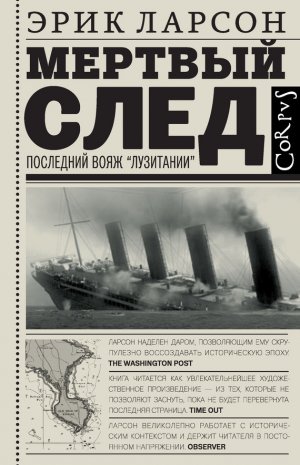Мертвый след. Последний вояж «Лузитании» Ларсон Эрик

Как ни странно, за неделю до того, как я отослал черновую версию книги редактору, в Желтом море затонул корейский паром “Севоль”, и сотни школьников пережили нечто очень похожее на то, что некогда – пассажиры “Лузитании”. Как-то утром, закончив переписывать кусок, где идет речь о сильном крене “Лузитании” и о том, как он помешал спускать шлюпки, через несколько минут я заглянул на сайт Си-эн-эн и прочел о том, что в точности то же самое произошло с “Севолем”.
Плавание на “Куин Мэри-2” – кстати сказать, прекрасном, грациозном корабле – позволило мне проникнуть в бесценные тайны трансатлантических вояжей. Даже сегодня, находясь посреди Атлантики, ты, по сути, одинок, а если произойдет какая-нибудь катастрофа, помощь далеко. В отличие от пассажиров “Лузитании”, перед отплытием из Нью-Йорка нам всем велели потренироваться надевать спасательные жилеты. Исключений не сделали ни для кого, сколько бы раз человек уже ни плавал. Дело было серьезное и, честно говоря, немного страшное, ведь, когда надеваешь спасательный жилет, непременно воображаешь невообразимое.
Когда пишешь о “Лузитании”, следует очень внимательно просеивать и взвешивать то, что уже опубликовано в книгах на данную тему. Есть ложные сведения и ложные факты, которые, будучи однажды запущены в поток научных работ, возникают снова и снова, а сноски всегда ведут обратно все к тем же виновникам. К счастью, у меня был проводник, помогавший мне во всем этом разбираться, Майк Пойрьер из Поутакета, штат Род-Айленд, историк-любитель, который, вероятно, знает о корабле и его пассажирах больше, чем кто-либо другой, и который прочел мою рукопись в поисках того, что могло бы вызвать гомерический хохот знатоков. Возникает ощущение, что Майк относится к пассажирам “Люси” с таким вниманием, как если бы они приходились ему родными племянниками. Он оказал мне неоценимую помощь. Кроме того, мне помогал еще один энтузиаст “Лузитании”, Джеффри Уитфилд, мой гид по современному Ливерпулю. Впрочем, считаю своим долгом заявить, что, если в книге и остались какие-либо ошибки, виноват в этом один лишь я.
В попытках оценить темп и целостность повествования – понять, удалась ли книга, – я полагался на когорту своих надежных первых читателей, среди которых были мои близкие друзья Керри Долан и Пенни Саймон, друг и агент Дэвид Блэк и мое секретное оружие – моя жена, Кристин Глисон, чьи пометки на полях – улыбающиеся рожицы, глаза, залитые слезами, стрелки, направленные вниз, и длинные ряды “хр-р-р-р”, – как обычно, послужили превосходными указателями, обозначив места удачные и неудачные. Мой редактор в издательстве “Краун паблишинг”, Аманда Кук, написала мне письмо на одиннадцати страницах, с помощью которого было замечательно легко работать над поправками к тексту. Она оказалась мастером в искусстве похвалы и при этом умудрилась вогнать мне под каждый ноготь по иголке, отчего я месяц просидел над обновлением книги – вероятно, то был самый напряженный писательский опыт в моей жизни. Я также благодарен корректору Элизабет Магнус, спасшей меня от ситуаций, когда одного персонажа я обидел, назвав “щеглом”, а пассажиров заставил “коробкаться” в шлюпки. Разумеется, я обязан поблагодарить троицу супергероев – термин моего изобретения – издательства “Краун”: Майю Мавджи, Молли Стерн и Дэвида Дрейка, которые, должен признаться, куда лучше моего справляются с мартини. Благодарю также Криса Брэнда и Даррена Хэггара за великолепную обложку. И наконец, слава настоящим героям, Эмме Берри и Саре Смит.
При сборе материала я старался, насколько возможно, опираться на архивные документы, однако весьма ценными оказались и вторичные источники: монументальная многотомная биография Вудро Вильсона, написанная Артуром С. Линком, озаглавленная попросту “Вильсон”, в которой наиболее полезным для меня был том “Борьба за нейтралитет, 1914–1915”; более поздняя книга А. Скотта Берга “Вильсон”; душераздирающая “Первая мировая война” Джона Кигана; “Первая мировая война” Мартина Гилберта; “План Шлиффена” Герхарда Рихтера; “Покорители глубин” – книга Лоуэлла Томаса о субмаринах Первой мировой и их экипажах, вышедшая в 1928 году; “Германский флот в Первую мировую войну” Рейнхарда Шеера, “Мировой кризис, 1911–1918” Черчилля; “Военные планы великих держав, 1880–1914” Пола Кеннеди и учебник Р. Г. Гибсона и Мориса Прендергаста “Германская подводная война, 1914–1918”.
Особенно мне понравились многочисленные сочинения, касающиеся личной истории – мемуары, автобиографии, дневники, – попавшиеся мне по пути; правда, с ними, разумеется, следовало обращаться особенно осторожно, учитывая ненадежную память и скрытые мотивы. Их величайшая ценность – в содержащихся в них мелких подробностях о жизни, какой она некогда была. Среди этих работ: “Старлинг из Белого дома”, автор – Эдмунд У. Старлинг, агент секретной службы Вильсона (“записал” Томас Сугру), позволившая мне заглянуть в свадебный поезд Вильсона; “Вудро Вильсон. Личные воспоминания” Кери Т. Грейсона, врача Вильсона; “Мои воспоминания” Эдит Боллинг Вильсон; “Командор” Джеймса Биссета; “Германский вояж” Пауля Кенига; “Журнал командира субмарины фон Форстнера” Георга-Гюнтера Фрейгерра фон Форстнера; “Последний вояж «Лузитании»” Чарльза Э. Лориэта-мл.; “Это был мой мир” Маграрет Макуорт (виконтессы Рондской); и “Когда приходили корабли” Джека Лоуренса. Еще одна работа личного характера, важная, поскольку дала мне представление о высшем обществе Британии перед войной, – “Волшебный фонарь. Дневники и письма Вайолет Бонэм Картер, 1904–1914”, под редакцией Марка Бонэма Картера и Марка Поттла, – книга, совершенно меня очаровавшая. Сознаюсь, я влюбился в Вайолет, дочь британского премьер-министра Герберта Генри Асквита.
Нижеследующий список цитат ни в коей мере не является исчерпывающим; для того чтобы процитировать каждый факт, потребовался бы сопутствующий том, неимоверно скучный. Привожу все цитированные материалы и все прочее, что по той или иной причине следует отметить или подчеркнуть, а также вещи, отсутствие которых могло бы заставить какого-нибудь энтузиаста “Лузитании” спалить шлюпку на лужайке у меня перед домом. В эти заметки включены краткие истории, не поместившиеся в основной текст, но все-таки показавшиеся мне достойными того, чтобы их рассказать, поскольку в них можно найти неожиданные объяснения, а также по самой убедительной причине на свете: просто так.
Библиография
Baker, James. Papers. Imperial War Museum, London. BBC Written Archives Centre. Caversham, Reading, England.
Bailey, Thomas Andrew, and Paul B. Ryan Collection. Hoover Institution Archives, Stanford University. Stanford, CA.
Bruford, Walter Horace. Papers. Churchill Archives, Churchill College, Cambridge, England.
Bryan, William Jennings. Papers. Library of Congress Manuscript Division. Washington, D.C.
Churchill, Winston. Papers. Churchill Archives, Churchill College, Cambridge, England.
Clarke, William F. Papers. Churchill Archives, Churchill College, Cambridge, England.
Cunard Archives (“Records of the Cunard Steamship Co.”), Sydney Jones Library, University of Liverpool, England. Courtesy of the University of Liverpool Library.
Denniston, Alexander Guthrie. Papers. Churchill Archives, Churchill College, Cambridge, England.
Fisher, Jacky. Papers. Churchill Archives, Churchill College, Cambridge, England.
Hall, William Reginald. Papers. Churchill Archives, Churchill College, Cambridge, England.
Harris, Dwight. Papers. New-York Historical Society. New York, N.Y. (File: BV Lusitania, MS 1757.) Courtesy of the NewYork Historical Society.
Hoehling, Adolf, and Mary Hoehling. Papers. RMS Lusitania Collection. Mariners’ Museum and Library. Christopher Newport University, Newport News, VA.
Hook, Hereward. Papers. Imperial War Museum, London.
Jellicoe, John. Papers. Churchill Archives, Churchill College, Cambridge, England.
Kell, Vernon. Papers. Imperial War Museum, London.
Lansing, Robert. Papers. Library of Congress Manuscript Division. Washington, DC (Desk Diaries and Private Memoranda).
Lorimer, D. Papers. Imperial War Museum, London.
Maritime Archives. Merseyside Maritime Museum. Liverpool, England.
McAdoo, William Gibbs. Papers. Library of Congress Manuscript Division. Washington, DC.
National Archives of the United Kingdom, Kew, England. Material cited in accord with Britain’s Open Government License.
Prichard, Mrs. G. S. Papers. Imperial War Museum, London.
Riddle, Theodate Pope. Papers. Hill-Stead Museum, Farmington, CT.
U.S. Department of State. Papers Relating to the Foreign Relations of the United States. 1915. Supplement, The World War. University of Wisconsin Digital Collections.
U.S. National Archives and Records Administration, College Park, MD.
U.S. National Archives and Records Administration at New York City. New York, NY.
Wilson, Woodrow. Papers. Library of Congress Manuscript Division. Washington, DC.
Albertini, Luigi. The Origins of the War of 1914. Translated by Isabella M. Massey. London: Oxford University Press, 1953.
Bailey, Thomas A. “German Documents Relating to the ‘Lusitania.’” Journal of Modern History 8, no. 3 (September 1936): 320–337.
Bailey, Thomas A. “The Sinking of the Lusitania.” American Historical Review 41, no. 1 (Oct. 1935): 54–73.
Bailey, Thomas A., and Paul B. Ryan. The Lusitania Disaster: An Episode in Modern Warfare and Diplomacy. New York: Free Press, 1975.
Ballard, Robert, with Spencer Dunmore. Exploring the Lusitania: Probing the Mysteries of the Sinking That Changed History. Toronto: Warner/ Madison Press, 1995.
Beesly, Patrick. Interview. “Sinking of the Lusitania.” Imperial War Museum, London.
Beesly, Patrick. Room 40: British Naval Intelligence, 1914–1918. London, Hamish Hamilton, 1982.
Berg, A. Scott. Wilson. New York: G. P. Putnam’s Sons, 2013.
Bernstorff, Count Johann-Heinrich von. My Three Years in America. New York: Scribner’s Sons, 1920.
Birnbaum, Karl E. Peace Moves and U-Boat Warfare. Stockholm: Almqvist and Wiksell, 1958.
Bisset, James. Commodore: War, Peace and Big Ships. London: Angus and Robertson, 1961.
Bixler, Julius Seelye. “William James and Immortality.” Journal of Religion 5, no. 4 (July 1925): 378–396.
Black, Jeremy. The Great War and the Making of the Modern World. New York: Continuum, 2011.
Boghardt, Thomas. The Zimmermann Telegram: Intelligence, Diplomacy, and America’s Entry into World War I. Annapolis, MD: Naval Institute Press, 2012.
Bolze, Thomas A. “From Private Passion to Public Virtue: Thomas B. Lockwood and the Making of a Cultural Philanthropist, 1895–1935.” Libraries and the Cultural Record 45, no. 4 (2010): 414–441.
Breemer, Jan S. Defeating the U-Boat: Inventing Antisubmarine Warfare. Newport, RI: Naval War College Press, 2010.
Brooks, Sydney. “The United States and the War: A British View.” North American Review 201, no. 711 (Feb. 1915): 231–40.
Broomfield, Andrea. “The Night the Good Ship Went Down.” Gastronomica 9, no. 4 (Fall 2009): 32–42.
Bullard, Melissa Meriam, S. R. Epstein, Benjamin G. Kohl, and Susan Mosher Stuard. “Where History and Theory Interact: Frederic C. Lane on the Emergence of Capitalism.” Speculum 79, no. 1 (Jan. 2004): 88–119.
Carter, Mark Bonham, and Mark Pottle, eds. Lantern Slides: The Diaries and Letters of Violet Bonham Carter, 1904–1914. London: Weidenfeld and Nicolson, 1996.
Churchill, Winston S. The World Crisis, 1911–1918. 1923. Reprint, London: Thornton Butterworth, 1931.
Clark, Alan. The Donkeys. London: Pimlico, 1961.
Clements, Kendrick A. “Woodrow Wilson and World War I.” Presidential Studies Quarterly 34, no. 1 (March 2004): 62–82.
Compton-Hall, Richard. Submarine Boats. New York: Arco, 1983.
Cooper, John Milton, Jr. The Vanity of Power: American Isolationism and the First World War, 1914–1917. Westport, CT: Greenwood, 1969.
Cooper, John Milton, Jr. Walter Hines Page: The Southerner as American, 1855–1918. Chapel Hill: University of North Carolina Press, 1977.
Cooper, John Milton, Jr. Woodrow Wilson. New York: Knopf, 2009.
Crow, Duncan. A Man of Push and Go: The Life of George Macaulay Booth. London: Rupert Hart-Davis, 1965.
Cullen, Fintan. “The Lane Bequest.” Field Day Review 4 (2008): 187–201.
Cummins, Cedric C. “Indiana’s Reaction to the Submarine Controversy of 1915.” Indiana Magazine of History 40, no. 1 (March 1944): 1–32. “The Cunard Liner Lusitania.” Journal of the American Society for Naval Engineers 19, no. 4 (Nov. 1907): 933–983.
Cunningham, Phyllis Fenn. My Godmother: Theodate Pope Riddle. Canaan, NH: Phoenix, 1983.
Devlin, Patrick. Too Proud to Fight: Woodrow Wilson’s Neutrality. New York: Oxford University Press, 1975.
Directory of Directors. City of Boston. Boston: Bankers’ Service Co., 1905.
Doerries, Reinhard R. Imperial Challenge: Ambassador Count Bernstorff and German-American Relations, 1908–1917. Translated by Christa D. Shannon. Chapel Hill: University of North Carolina Press, 1989.
Doyle, Arthur Conan. “Danger!” In Danger! and Other Stories. London: John Murray, 1918.
Egan, Timothy. Short Nights of the Shadow Catcher. Boston: Houghton Mifflin, 2013.
Figueiredo, Peter de. “Symbols of Empire: The Buildings of the Liverpool Waterfront.” Architectural History 46 (2003): 229–254.
Fontenoy, Paul. Submarines: An Illustrated History of Their Impact. Weapons and Warfare. Santa Barbara, CA: ABC–CLIO, 2007.
Forstner, Georg-Gunther Freiherr von. The Journal of Submarine Commander von Forstner. Translated by Mrs. Russell Codman. Boston: Houghton Mifflin, 1917.
Fox, Stephen. Transatlantic: Samuel Cunard, Isambard Brunel, and the Great Atlantic Steamships. New York: HarperCollins, 2003.
Frost, Wesley. German Submarine Warfare: A Study of Its Methods and Spirit. New York: D. Appleton, 1918.
Frothingham, Thomas G. The Naval History of the World War. Vol. 1. Cambridge, MA: Harvard University Press, 1925.
Gannon, Paul. Inside Room 40: The Codebreakers of World War I. Hersham, Surrey, UK: Ian Allan, 2010.
Garzke, William H., Jr., D. K. Brown, A. D. Sandiford, J. Woodward, and P. K. Hsu. “The Titanic and Lusitania: A Final Forensic Analysis.” Marine Technology 33, no. 4 (Oct. 1996): 241–289.
Gibson, R. H., and Maurice Prendergast. The German Submarine War 1914–1918. 1931. Reprint, Uckfield, East Sussex: Naval and Military Press, 2003.
Gilbert, Martin. The First World War. New York: Henry Holt, 1994.
Grant, Robert M. U-Boat Intelligence, 1914–1918. North Haven, CT: Archon Books, 1969.
Grayson, Cary T. Woodrow Wilson: An Intimate Memoir. 1960. Reprint, Washington, DC: Potomac Books, 1977.
Halpern, Paul G. A Naval History of World War I. Annapolis, MD: Naval Institute Press, 2012.
Hart, Peter. Gallipoli. New York: Oxford University Press, 2011.
Hazen, David W. Giants and Ghosts of Central Europe. Portland, OR: Metropolitan Press, 1933.
Hendrick, Burton J. The Life and Letters of Walter H. Page. Vols. 1–3. Garden City, NY: Doubleday, Page, 1922.
Hoehling, Adolf A., and Mary Hoehling. The Last Voyage of the Lusitania. London: Longmans, Green, 1957.
Holbourn, Ian B. Stoughton. The Isle of Foula. 1938. Reprint, Edinburgh: Birlinn, 2001.
Horgan, John J. Parnell to Pearse: Some Recollections and Reflections. 1949. Reprint, Dublin: University College Press, 2009.
Hough, Richard. Winston and Clementine. London: Transworld, 1990. Houston, David F. Eight Years with Wilson’s Cabinet, 1913 to 1920. New York: Doubleday, Page, 1926.
James, Adm. William. The Code Breakers of Room 40. New York: St. Martin’s Press, 1956.
James, William. “Address of the President Before the Society for Psychical Research.” Science, n.s., 3, no. 77 (June 19, 1896): 881–888.
Kahn, David. The Codebreakers: The Story of Secret Writing. New York: Macmillan, 1967.
Kalafus, Jim, Michael Poirier, Cliff Barry, and Peter Kelly. Lest We Forget: The Lusitania. Published online, May 7, 2013. www.encyclopedia-titanica.org/lest-we-forget-the-lusitania. html.
Katz, Sandra L. Dearest of Geniuses: A Life of Theodate Pope. Windsor, CT: Tide-Mark Press, 2003.
Keegan, John. The First World War. New York: Vintage Books, 1998. Kennedy, Paul M. The War Plans of the Great Powers, 1880–1914. London: George Allen and Unwin, 1979.
Kilgour, Raymond L. Estes and Lauriat: A History, 1872–1898. Ann Arbor: University of Michigan Press, 1957.
Knight, Denise D. “‘All the Facts of the Case’: Gilman’s Lost Letter to Dr. S. Weir Mitchell.” American Literary Realism 37, no. 3 (Spring 2005): 259–277.
Koenig, Paul. Voyage of the Deutschland. New York: Hearst’s International Library, 1917.
Koerver, Hans Joachim. German Submarine Warfare 1914–1918 in the Eyes of British Intelligence. Steinbach, Austria: LIS Reinisch, 2012. http://germannavalwarfare.info/01gnw/subm/ jpg/subm.pdf.
Lambert, Nicholas. The Submarine Service, 1900–1918. London: Ashgate, 2001.
Lamont, Peter. “Spiritualism and a Mid-Victorian Crisis of Evidence.” Historical Journal 47, no. 4 (2004): 897–920.
Lane, Anne Wintermute, and Louise Herrick Wall, eds. The Letters of Franklin K. Lane. Boston: Houghton Mifflin, 1922.
Larson, Erik. Thunderstruck. New York: Crown, 2006.
Lauriat, Charles E., Jr. The Lusitania’s Last Voyage. Boston: Houghton Mifflin, 1915.
Lawrence, Jack. When the Ships Came In. New York: Farrar and Rinehart, 1940.
Levin, Phyllis Lee. Edith and Woodrow. New York: Scribner, 2001.
Link, Arthur S. “Dr. Grayson’s Predicament.” Proceedings of the American Philosophical Society 138, no. 4 (Dec. 1994): 487–494.
Link, Arthur S. Wilson: Campaigns for Progressivism and Peace, 1916–1917. Princeton, NJ: Princeton University Press, 1965.
Link, Arthur S. Wilson: Confusions and Crises, 1915–1916. Princeton, NJ: Princeton University Press, 1964.
Link, Arthur S. Wilson: The Struggle for Neutrality, 1914–1915. Princeton, NJ: Princeton University Press, 1960.
Lord, Walter. A Night to Remember. New York: Henry Holt, 1955.
Mackworth, Margaret. This Was My World. London: Macmillan, 1933.
Marcosson, Isaac F., and Danniel Frohman. Charles Frohman: Manager and Man. New York: Harper and Brothers, 1916.
Marder, Arthur J. Fear God and Dread Nought: The Correspondence of Admiral of the Fleet Lord Fisher of Kilverstone. Vols. 2 and 3. London: Jonathan Cape, 1959.
Marder, Arthur J. From the Dreadnought to Scapa Flow: The Royal Navy in the Fisher Era, 1904–1919. Vol. 2. London: Oxford University Press, 1965.
Mellown, Muriel. “Lady Rhondda and the Changing Faces of British Feminism.” Frontiers 9, no. 2 (1987): 7–13.
Mersey, Lord (John Charles Bingham). Report on the Loss of the “Falaba.” London: H. M. Stationery Office, 1915.
Messimer, Dwight R. The Merchant U-Boat. Annapolis, MD: Naval Institute Press, 1988.
Mitchell, S. Weir. Doctor and Patient. Philadelphia: J. B. Lippincott, 1888.
Mitchell, S. Weir. Fat and Blood: And How to Make Them. Philadelphia: J. B. Lippincott, 1877.
Mitchell, S. Weir. Wear and Tear or Hints for the Overworked. Philadelphia: J. B. Lippincott, 1897.
Morton, Leslie. The Long Wake. London: Routledge and Kegan Paul, 1968.
Neureuther, Karl, and Claus Bergen, eds. U-Boat Stories. Uckfield, East Sussex, UK: Naval and Military Press, 2005.
Niemller, Martin. From U-Boat to Pulpit. Chicago: Willett, Clark, 1937. Paine, Judith. “Avon Old Farms School: The Architecture of Theodate Pope Riddle.” Perspecta 18 (1982): 42–48.
Preston, Diana. Lusitania: An Epic Tragedy. New York: Walker, 2002.
Ramsay, David. “Blinker” Hall: Spymaster. Gloucestershire, UK: History Press, 2009.
Preston, Diana. Lusitania: Saga and Myth. New York: W. W. Norton, 2002.
Rintelen, Franz von. The Dark Invader: Wartime Reminiscences of a German Naval Officer. New York: Penguin, 1939.
Ritter, Gerhard. The Schlieffen Plan. Translated by Andrew and Eva Wilson. New York: Frederick A. Praeger, 1958.
Rssler, Eberhard. The U-Boat. Translated by Harold Erenberg. London: Arms and Armour Press, 1981.
Rossano, Geoffrey L. Stalking the U-Boat: U.S. Naval Aviation in Europe During World War I. Gainesville: University Press of Florida, 2010.
Sargent, George H. Lauriat’s, 1872–1922. Boston: privately printed, 1922.
Schachtman, Tom. Edith and Woodrow. New York: G. P. Putnam’s Sons, 1981.
Schachtman, Tom. Edith and Woodrow. New York: G. P. Putnam’s Sons, 1981.
Scheer, Reinhard. Germany’s High Sea Fleet in the World War. 1919. Reprint, New York: Peter Smith, 1934.
Seymour, Charles. The Intimate Papers of Colonel House. Vols. 1 and 2. Boston: Houghton Mifflin, 1926.
Sims, William Sowden. The Victory at Sea. 1920. Reprint, Annapolis: Naval Institute Press, 1984.
Smith, Gene. When the Cheering Stopped: The Last Years of Woodrow Wilson. New York: William Morrow, 1964.
Smith, Sharon Dunlap. Theodate Pope Riddle: Her Life and Architecture. 2002. www.valinet.com/~smithash/theodate/.
Soames, Mary. Clementine Churchill: The Biography of a Marriage. Boston: Houghton Mifflin, 1979.
Spiegel, Edgar von. The Adventures of the U-202. New York: Century, 1917. Google Book.
Starling, Edmund W. (as told to Thomas Sugrue). Starling of the White House. 1916. Reprint, Chicago: People’s Book Club, 1946.
Steinberg, Jonathan. Yesterday’s Deterrent: Tirpitz and the Birth of the German Battle Fleet. New York: Macmillan, 1965.
Sullivan, Mark. Our Times, 1900–1925. New York: Charles Scribner’s Sons, 1936.
Szefel, Lisa. “Beauty and William Braithwaite.” Callaloo 29, no. 2 (Spring 2006): 560–586.
Thomas, Lowell. Raiders of the Deep. Garden City, NY: Garden City Publishing, 1928.
Thomson, George Malcolm. The Twelve Days: 24 July to 4 August 1914. London: Hutchinson, 1964.
Trapp, Georg von. To the Last Salute: Memories of an Austrian U-Boat Commander. Translated by Elizabeth M. Campbell. Lincoln: University of Nebraska Press, 2007.
Trommler, Frank. “The Lusitania Effect: America’s Mobilization Against Germany in World War I.” German Studies Review 32, no. 2 (May 2009): 241–266.
Tuchman, Barbara W. The Zimmermann Telegram. 1958. Reprint, New York: MacMillan, 1966.
“The Use of Neutral Flags on Merchant Vessels of Belligerents.” American Journal of International Law 9, no. 2 (April 1915): 471–473.
U.S. Navy Department. German Submarine Activities on the Atlantic Coast of the United States and Canada. Washington, DC: GPO, 1920.
Valentiner, Max. La terreur des mers: Mes aventures en sous-marin, 1914–1918. Paris: Payot, 1931.
Villard, Oswald Garrison. Fighting Years: Memoirs of a Liberal Editor. New York: Harcourt, Brace, 1939.
Walker, Alastair. Four Thousand Lives Lost: The Inquiries of Lord Mersey into the Sinkings of the Titanic, the Empress of Ireland, the Falaba, and the Lusitania. Stroud, Gloucestershire, UK: History Press, 2012.
Ward, Maisie. Father Maturin. London: Longmans, Green, 1920.
Weinberg, Andrew D. “Hypothermia.” Annals of Emergency Medicine 22, pt. 2 (Feb. 1993): 370–377.
Weir, Gary E. Building the Kaiser’s Navy. Annapolis, MD: Naval Institute Press, 1992.
Weizscker, Ernst von. Memoirs of Ernst von Weizscker. London: Victor Gollancz, 1951.
Wilson, Edith Bolling. My Memoir. 1938. Reprint, New York: Bobbs-Merrill, 1939.
Wood, M. G., D. I. Smith, and M. R. Hayns. “The Sinking of the Lusitania: Reviewing the Evidence.” Science and Justice 42, no. 3 (2002): 173–188.
Сокращения, использованные в комментариях
Foreign Relations
U.S. Department of State, Papers Relating to the Foreign Relations of the United States. 1915, Supplement, The World War, University of Wisconsin Digital Collections, http://digital.library.wisc.edu/1711.dl/ FRUS.FRUS1915Supp.
“Investigation”
“Investigation into the Loss of the Steamship ‘Lusitania’”, Proceedings Before the Right Hon. Lord Mersey, Wreck Commissioner of the United Kingdom, June 15–July 1, 1915, National Archives UK.
Lauriat, Claim
Charles E. Lauriat Jr., Claim, Lauriat vs. Germany, Docket 40, Mixed Claims Commission: United States and Germany, Aug. 10, 1922. U.S. National Archives and Records Administration at College Park, MD.
Merseyside
Maritime Archives, Merseyside Maritime Museum.
Schwieger, War Log
Walther Schwieger, War Log. Bailey/Ryan Collection, Hoover Institution Archives, Stanford University, Stanford, CA.
U.S. National Archives and Records Administration at College Park, MD.
U.S. National Archives – New York.
U.S. National Archives and Records Administration at New York City.
1
См. New York Times, May 1, 1915. Объявление о предупреждении напечатано на с. 3, сам текст его – на с. 19.
2
Liverpool Weekly Mercury, May 15, 1915.
3
Preston, Lusitania, 172.
4
Bailey and Ryan, Lusitania Disaster, 82.
5
Там же, 65; Beesly, Room 40, 93; Ramsay, Lusitania, 50, 51.
6
Свидетельские показания, Testimony, Thomas M. Taylor, Petition of the Cunard Steamship Company, April 15, 1918, U. S. National Archives – New York, 913.
7
“General Analysis of Passengers and Crew”, R. M. S. Lusitania: Record of Passengers & Crew, SAS/29/6/18, Merseyside.
8
New York Times, May 2, 1915.
9
Cunard Daily Bulletin, July 19, 1907, Merseyside.
10
Там же.
11
Там же.
12






